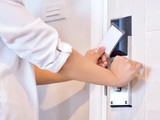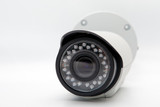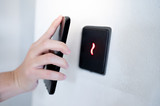How to Choose an IP Camera
Introduction
Whether you're a small business owner or an at-home parent, the idea of home and office security is on everyone's mind. While there are plenty of ways to keep tabs on your property, one of the most effective methods is an IP camera. An IP camera is basically a digital camera that connects to your network either via Ethernet cable or wirelessly – and then sends live video feeds to your computer or phone. But with so many different options out there, how do you know which one will best suit your needs? We'll take a look at some factors that play into choosing an IP camera: how they're wired and networked, what kind of storage they use (and whether they need any), how much they cost, etc. Let's get started!
Considerations when choosing an IP camera
When choosing an IP camera, there are a number of considerations to keep in mind.
- Price. The cost of an IP camera is often a deciding factor for buyers. When comparing prices, it's important to consider the features you want most and your budget limitations.
- Resolution and video quality. The resolution of any given IP camera refers to the number of pixels or dots that make up its images (a higher number means greater detail). You'll also want to consider whether you need high-definition or standard definition cameras—higher-resolution cameras will offer clearer pictures but may also be more expensive than SD models. As video quality increases, so does file size; if you plan on recording hours upon hours of footage every day, this could become costly quickly!
- Night vision capability (or lack thereof). If you're installing your camera outdoors or in an area where light sources might be scarce during nighttime hours (like inside a garage), then night vision capability should definitely be one of your top priorities when comparing different models available through different brands' websites online today—and remember: it's always best practice before purchasing anything online anywhere from anywhere other than directly from sources like Amazon where possible because unverified vendors can sell fakes as authentic products which could potentially cause issues later down the line when trying get warranty/support services from original manufacturers instead since they won't recognize fake serial numbers either which means no warranty support would be available at all even though these companies usually offer several years worth guaranteed coverage on their goods anyway so long term reliability isn't really something people worry about much anymore thanks advances made over past few decades combined with increased public awareness due recent popularity rise social media platforms like Twitter Facebook Instagram Snapchat etcetera etcetera etcetera
Ethernet cable network vs. wireless
There are two ways to set up an IP camera: wired or wireless. The wired option is more expensive, but it's also less complicated and offers a greater degree of security. If you choose to go with the wireless route, however, keep in mind that this option requires more effort on your part while providing less security than its wired counterpart.
Wireless IP cameras require that you have a strong enough signal between the camera and your router (or hub) in order to stream video feed reliably. If there isn't enough bandwidth available in that particular area of your home or office—say if there's another network device already using most of it—then you'll find yourself dealing with frequent interruptions in service as well as degraded picture quality due to buffering problems or low resolution settings being used by those devices connected within range of one another's signals (e.g., smartphones).
Wireless is also susceptible to hacking attacks from outside sources such as malware installed on computers connected by Wi-Fi routers nearby—this makes these devices more dangerous than their corded counterparts which do not share an air space with other users' devices so closely like they do with those who use Wi-Fi networks at home or work locations."
Outdoor vs. indoor surveillance
There are a number of considerations when choosing an IP camera, including the type of surveillance you want to use it for. An outdoor camera is more durable and can withstand weather conditions better than indoor cameras, but they’re also more expensive and difficult to install. Although most people will use an indoor IP camera, there are many advantages to having a durable model for outdoor surveillance as well.
For example:
- Outdoor cameras are generally more expensive than their indoor counterparts because they must be able to withstand adverse weather conditions like rain or snow without becoming damaged by moisture. They also need additional features such as heaters or blowers in order to keep them running smoothly in subzero temperatures during winter months when temperatures drop below freezing at nightfall (or even during warm days). If you live in a particularly hot climate where humidity levels soar above 75%, consider looking into installing one that has built-in air conditioning functionality so that moisture doesn't collect on its lenses causing them not function properly over time
Fixed-position vs. pan, tilt and zoom (PTZ)
- Pan, tilt, and zoom (PTZ) cameras offer the most flexibility. These types of cameras can be controlled remotely to track moving objects or focus on details in the view area. They're more expensive than fixed-position models but have many advantages over them.
- Fixed-position cameras have a fixed field of view and are less expensive than PTZ models.
Standalone vs. PC-based IP cameras
Standalone cameras are easier to install, configure and operate. They're also more secure because they don't require a network. However, standalone cameras are limited in terms of their functionality and versatility. For example, you can't use them for other purposes such as monitoring your home environment or recording video for security reasons outside the workplace (think about how you might use an IP camera at home).
PC-based cameras are more versatile but also more expensive than standalone ones because they require a dedicated computer with high-end hardware specifications in order to work properly. Additionally, PC-based cameras require software installation on each system where they will be used before they can be configured or monitored remotely over the internet by securely connecting clients such as mobile apps running on smartphones/tablets or PCs via Wi-Fi networks or wired connections like Ethernet cables plugged into both ends of each device so that only one side needs power while being connected together via wires (this means no batteries needed!).
Video storage options for IP cameras
IP cameras can store video in one of two places: on the camera itself or in the cloud. If you choose to use local storage, you'll need to buy a hard drive for your camera and physically install it. Cloud-based systems don't require additional hardware purchases, but they are more expensive and require that you stay connected to the internet at all times.
Since most people have cell phones these days, there's little reason not to use cloud services if they're available. If your security network goes down while the power is out at home, having secure backup recordings stored remotely would give you peace of mind until service returns—and even then you'll be able to access recorded footage right away rather than waiting for technicians who may take some time before getting around to completing repairs (or call back).
IP cameras can give you a big boost in home or office security, so be sure to make the best choice
IP cameras can give you a big boost in home or office security, so be sure to make the best choice.
To get the most out of your camera, you'll want to keep these things in mind:
- The quality of the video footage is important; look for HD resolution and night vision capability.
- Be sure that it will work with your existing wireless network and router.
Conclusion
An IP camera is a fantastic choice if your home or office needs extra security. It can help you keep an eye on things when you’re not there, and it can save you from having to use costly security guards all the time. With so many options available, making sure that you choose one that’s right for your needs will save money in the long run and make life easier for everyone involved!
Recent Posts
-
How Access Control Enhances Compliance & Safety
How Access Control Enhances Compliance & Safety In today’s regulatory-driven and security-conscio … -
Scaling Your Video Management System: Best Practices for Growing Businesses
As your business expands, so do your security needs. Scaling your Video Management System (VMS) effi … -
The Role of Night Vision and Low-Light Cameras in Security
The Role of Night Vision and Low-Light Cameras in Security Security threats don’t stop when the sun … -
Mobile Access Control & Mobile Credentials
The Complete Guide to the Future of Secure, Touchless Access What Is Mobile Access Control? Mobil …





